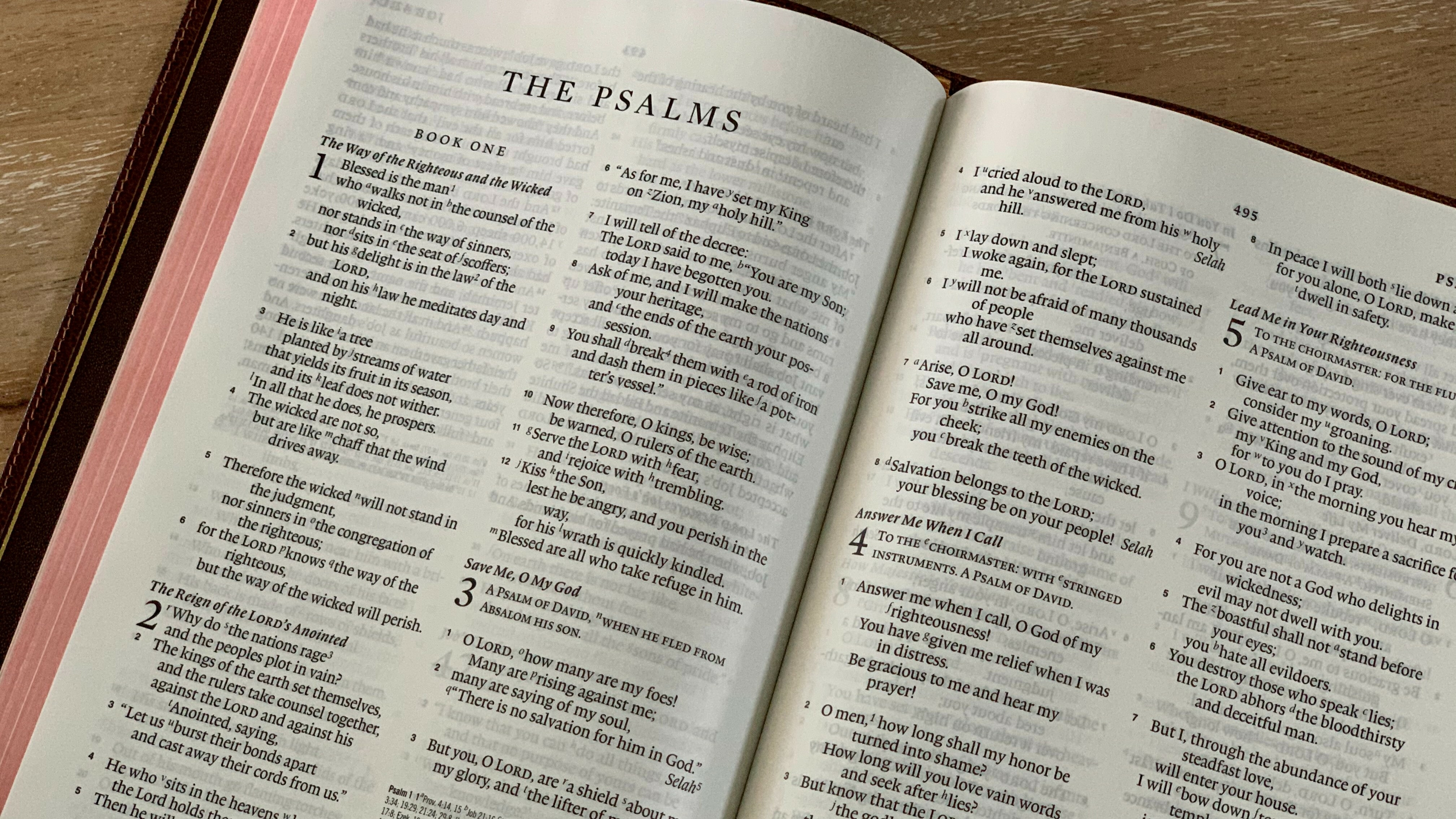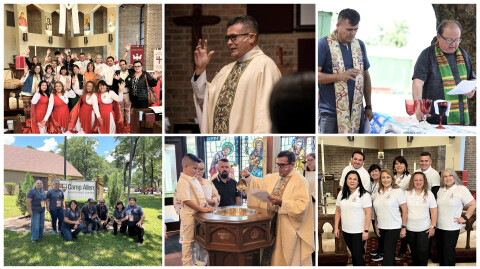TLDR: By the time the Christian movement started, the Book of Psalms had become central to the life of Israel. The influence of Psalms on the development of the Christian movement cannot be understated.
I have been doing a Bible study on the Book of Psalms at The Villages of Gleannloch for the last several months, and I confess that I am having a great time. The book of Psalms is a combination of 150 Psalms arranged in five particular books in the following way: Book 1 (Psalms 1–41,) Book 2 (Psalms 42–72,) Book 3 (Psalms 73–89,) Book 4 (Psalms 90–106,) and Book 5 (Psalms 107–150.) The Roman Catholic Church accepted the Greek translation of the Bible called the Septuagint (later translated into Latin by Saint Jerome,) and that translation divides the Psalms a bit differently. As a result, Catholic Bibles have 151 Psalms. The Episcopal Church uses the Hebrew Bible numbering for the Psalms, which comes to 150. The arrangement into five books seeks to honor and reflect the Pentateuch, or the so-called five books of Moses.
We know when each book ends and the other starts because the compilers of the canonical book of Psalms give us five “Benedictions,” at the end of each book. Book One ends at Psalm 41:13, “Blessed be the Lord, the God of Israel, from everlasting to everlasting. Amen and Amen.” Book Two ends at Psalm 72:18-19, “Blessed be the Lord, the God of Israel, who alone does wondrous things. Blessed be his glorious name for ever; may his glory fill the whole earth. Amen and Amen.” Book Three ends at Psalm 89:52, “Blessed be the Lord forever. Amen and Amen.” Book Four ends at Psalm 106:48, “Blessed be the Lord, the God of Israel, from everlasting to everlasting. And let all the people say, ‘Amen.’ Praise the Lord!” Lastly, Book Five ends at Psalm 150:6 “Let everything that has breath praise the Lord. Praise the Lord.”
The composition of the Psalter was achieved over a thousand years, and many of these beautiful compositions were passed in oral tradition from generation to generation before they were written down. Some of the earlier collections of Psalms pre-date or were written during the exile to Egypt (1400 BCE,) some were written after the Exile, especially those associated with the establishment of festivals (Psalms 113-118 for Pilgrim festivals, Psalm 136 Morning Day of Sabbath, etc.) It is believed that many of the Royal Psalms were composed by David, or in the style of David, before the Babylonian experience. A great number of Psalms were composed during and after the Babylonian captivity. Lastly, some authors believe that some Psalms date from the fourth century and even the third century before Christ.
What we do know is that the collection of Psalms were assembled, edited, organized, and accepted as part of the Jewish Bible at some point after the exile to Babylon ended, during the earliest part of a period of time we call “Second Temple Judaism.” (From 516 BCE to 70 CE.) When the people of God returned from captivity, they began a “forensic analysis” of the exile. They returned to a demolished Judah, which had gone from independent state to a small province of the Persian Empire. They now faced the arduous work of rebuilding their cities and erecting a new temple. In the meantime, the Jewish Diaspora (people who lived outside of the Holy Land) had grown considerably, and many of them were being absorbed into the known empires of the day. Later on, they will have to deal with the conquest of Alexander the Great and their encounter with Hellenism, the Maccabean revolt, the brief restoration of the Jewish State, and the Roman conquest of Palestine.
We know quite a bit about this community who returned to the Holy Land from Babylon. Of the approximately half a million people in Babylon, only about 10% returned. “The whole assembly together was 42,360 besides their male and female servants, of whom there were 7,337, and they had 200 male and female singers.” (Ezra 2:64-65.) These 50,000 found a group of people in the land, which had been left behind by the Babylonians, “But the captain of the guard left some of the poorest of the land to be vinedressers and plowmen.” (2 Kgs 25:12.) Together, the dispirited “Jewish Remnant” were given the task to rebuild Israel. Now, why did so few of them return? The answer is not simple, but we do know that many had settled in Babylon, perhaps in obedience to the Prophet Jeremiah, “Build houses and live in them; plant gardens and eat their produce. Take wives and have sons and daughters; take wives for your sons, and give your daughters in marriage, that they may bear sons and daughters; multiply there, and do not decrease. But seek the welfare of the city where I have sent you into exile, and pray to the Lord on its behalf, for in its welfare you will find your welfare.” (Jeremiah 29:5-7.) Babylon had become “home,” so many stayed behind. A second group had settled in Egypt prior to the exile to Babylon, “Then all the people, both small and great, and the captains of the forces arose and went to Egypt, for they were afraid of the Chaldeans.” (2 Kings 25:26.) Many of these people stayed in Egypt where they had settled and even thrived.
As the remnant contemplates the desolation in their land, they asked questions like, “Why did the exile happen? What happened to God’s promises for a royal line that would never end? Can God be trusted? Are the Covenants between God and his people over? Are we still the people of God? How can we understand our relationship with God in light of what just happened to us? Etc.” It is believed that the Psalms gave the people of God the language they needed to voice their new understanding of God, and elevate to that God all their prayers, laments, and thanksgivings. Most of the Psalms were written in Hebrew and Aramaic, although many had been translated to Greek as early as the fourth century before Christ during the advance of Hellenism. Some may have also inherited an extra verse in Greek to speak to the new context of the people of God in the fourth and third centuries.
The Psalms gave this remnant a renewed interest in the law, a great resource for personal and corporate worship, and a re-interpretation of the Covenants and God’s promises to David. They began to see in the Psalms the possibility for a future restoration of the Davidic monarchy under a yet-to-come Messiah. The Psalms became the “Hymnbook of the Second Temple,” used for cultic and personal devotion. By the time the Christian movement started with Jesus of Nazareth, the Psalms had become central to the life and worship of Israel. In fact, the influence of the Psalms on the development of the New Testament can never be understated. About two thirds of all Jewish Scripture (OT) quotes in the New Testament come from the Psalms. Jesus himself quotes the Psalms often, including a famous line from Psalm 22 which he used on the day of his crucifixion.
I pray that this brief article will spark your interest in the Book of Psalms. I find them as “sweet as honey on the comb.” They are my balm of Gilead, a constant source of comfort and strength.
May God continue to bless you and yours,
Fr. Roman+





